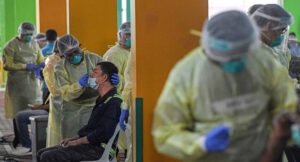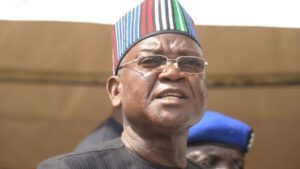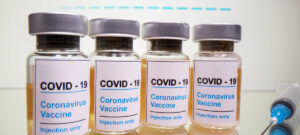By Gabriel Atumeyi
The birth of COVID-19 vaccines
As Coronavirus continues to ravage the world, vaccines have become a source of solace and hope to many who fear the possibility of not seeing tomorrow because of the virus.

*File photo of sample collection for Coronavirus testing
Many countries, especially in Europe and America, have begun vaccinations against the virus after approval of brands ranging from Pfizer/BioNTech to Moderna to Oxford- Astra Zeneca.
Countries like India, China and Russia have announced that they would be producing their own vaccines to contain the escalation of transmission, restore economic activities and save lives.
So far, there has been about 2 million deaths and 90 million confirmed cases globally, according to records quoted by the British Broadcasting Corporation, BBC, from John Hopkins University. Here in Nigeria, government officials have indicated that the vaccines would soon hit the nation’s shores, especially through the COVAX facility. The National Primary Health Care Development Agency (NHPDC), has already announced quota of doses to be allotted to states of the federation, but what remains unclear, yet very important, is how the Nigerian public will respond to the call for vaccination.
Presently, there are a million and one conspiracy theories and rumours circulating, building distrust and apprehension about the health or moral implication of submitting to the vaccine.
Distribution to states
According to data recently released by the Executive Director of the National Primary Healthcare Development Agency (NPHCDA), Faisal Shuaib, the 36 states of the Federation and the Federal Capital Territory (FCT) would, in the interim, share a hundred thousand (100,000) doses of COVID -19 vaccines, while awaiting another consignment of 42 million free doses later. This hint was given by the agency in December last year.

*NPHCDA DG, Shuaib
A breakdown showed that Kano State would get the highest allocation of vaccines with 3,557, while Lagos followed with 3,131 vaccines.
The data shared by NPHCDA also indicated that Katsina will get 2,361; Kaduna, 2,074; Bauchi, 1,900; Cross River, 1,023; Oyo, 1,848; Rivers, 1,766; Jigawa, 1,712; Niger, 1,558; Ogun, 1,473; Sokoto, 1,468; Benue, 1,423; Borno, 1,416; Anambra, 1,379; Kebbi, 1,268; Zamfara, 1,336; Delta, 1,306; Imo, 1,267; Ondo, 1,228; and Akwa Ibom, 1,161.
Others are Adamawa, 1,129; Edo, 1,104; Plateau, 1,089; Enugu, 1,088; Osun, 1,032; Kogi, 1,030; Abia, 955; Gombe, 908; Yobe, 842; , 830; Taraba, 830; Kwara, 815; Ebonyi, 747; Bayelsa, 589; FCT, 695 and Nasarawa, 661.
….As Governors query allocation process
Governor Babajide Sanwo-Olu of Lagos State and his Oyo State counterpart, Seyi Makinde, have already expressed desire of their respective states to fill the shortfall in vaccine availability by purchasing directly for their individual states.
The allocation of the doses per state, as announced by NPHCDA, did not augur well with many governors who have queried how the sharing formula for the vaccines was arrived at. According to them, the allocation of the vaccines ought to have been discussed at the level of the Nigeria Governors’ Forum (NGF).

Governor Samuel Ortom of Benue State, in a reaction, lamented that “the issue of allocation of COVID-19 vaccine doses ought to have been discussed at the Nigeria Governors’ Forum.”
Conspiracies, rumours, misinformation threaten acceptance of the vaccine by Nigerians
While the governors and other stakeholders have been making frantic efforts and preparations for getting and storing the vaccines, wild controversies and conspiracy theories have been raging across the country.
Many Nigerians have expressed skepticism about the vaccine, especially in the northern region, which has a history of distrust for and outright rejection of vaccines.
This is usually premised on suspicion stemming from cultural, political or religious beliefs. When a rumour surfaced in 2003 that Nigeria’s polio vaccine was allegedly contaminated with anti-fertility agents, a boycott of the vaccine ensued and the country’s polio immunisation campaign was dealt a heavy blow.
The boycott lasted for nearly 15 months – from February, 2003 to July, 2004 – and it had devastating consequences. The polio caseload shot up. And by 2008, Nigeria alone accounted for 86% of all the polio cases on the continent.
Now, the COVID -19 vaccines have similar rumours dancing around it. What seems to be worsening the situation is the fact that it is a novel virus and no precedence has been set regarding the efficacy or side effects of the vaccines. Also contributing to theories against the virus is the deep distrust for the authorities.
Scam, immoral, sinful
Since the news of COVID-19 infection in Nigeria broke, many Nigerians have concluded that it is nothing but a scam by some individuals in authority to cash out big on public funds. This perception remains strong till date.
Drawing from that, there seems to be a sharp division on the purpose and intent of the vaccines produced to put the spread of the virus in check. Fuelled by ignorance and outright falsehood, some people believe in a conspiracy theory that the vaccines are targeted at decimating the population of Africa. This is also a popular feeling among many Nigerians.
In like vein, a section of adherents to a certain faith believe that it is a precursor to the introduction of the Biblical mark of the beast.
Another section of Nigerians believe that the government and indeed the elite intend to procure and administer the more sophisticated Pfizer/ Bioneth, Oxford Astra Zeneca or the Moderna vaccines from advanced European countries for themselves, while making available cheaper vaccine variants for average Nigerians, thus exposing them to potentially harmful reactions.
365Daily spoke to a cross section of Nigerians on whether they will partake in the vaccination when made available and relates the responses below.
One Ike Ummar said from the reports he is getting, the vaccines may have adverse effects.
“My own take is that I wouldn’t want to take it because I am not infected. I don’t have the virus. Some people are saying if you take the vaccine, it will affect your DNA or something like that.
“There is much that has not been answered. Why are the poor people not catching it like the rich. People need to ask critical questions,” Ummar said.
Another respondent, Benson Ogenhi, an apprentice in computer repairs, said, “If NAFDAC certifies it safe and appropriate, I will take it. And if others are taking it without any negative outcome, I will also take it.”
But for Abbey Bayo Fabian, a real estate engineer, the travel directories of some Western countries is a pointer to the agenda behind the vaccines.
“I won’t accept it. I don’t believe in it. There is a spirit behind it. The fact that if you don’t have it there are some countries that will not allow you entry; Why is it like that?

“And this is something that should be voluntary. But some countries say if you don’t have it you cannot enter their country. That means if you don’t have it, you are forced to take the vaccine. What does that mean? So there is something behind it. If you listen to ordinary Ahmed on Brekete Radio when he said he is not against it but he wants to ascertain the genuineness and authenticity of the vaccine before they administer it on the people of Africa.”
Also speaking, Tony Anusi, who runs a pharmacy in Bwari Area Council of the Federal Capital Territory, said the vaccine deployment should be expedited so that lives and the economy can return to normal.
He said in response to enquiries about accepting the vaccine, “Why not? There will always be rumours. Have they not been giving polio vaccine? Is polio vaccine not a vaccine? It is a vaccine. Why hasn’t it killed anybody? Based on that, it is not meant to kill anybody.
“Some things have to be tackled based on how they come. There will always be rumours. There will always be religious or political rumours and all sorts of rumours. But what is best for us is what we will do. It won’t be compulsory.
“If the vaccine is able to protect against Coronavirus, we can continue with our normal lives,” Anusi said.
In her own view, Chioma Oniuke expressed total rejection of the COVID -19 vaccine because of “some unanswered questions”.
“I won’t take it. Why is there no vaccine for malaria or for ulcer or for tuberculosis or the rest but for COVID-19? Just after several months there is vaccine for it now. I think there is something we don’t know about.”
Felix Fani, a civil servant with the National Bureau of Statistics, believes Nigerians should not be forced to take the vaccine. He said it is not necessary and few would put themselves up for it, himself inclusive.
“I won’t take it since it is voluntary. I don’t think even the leading government officials, even the President and his Vice President, and the members of their cabinet would take it.
“I think the Western world is only projecting their fears on us,” he declared.
Muhammed Muktar Ibrahim, a businessman in the Wuse axis of Abuja, shares a different view from Fani. According to him, since the President and his cabinet have assured the nation of the vaccine’s safety, there should be no qualms about accepting it.
Ibrahim: “I will be very much interested in this vaccine because of the current situation in the country. People close to you are now having COVID-19, people you don’t expect to have it. Most of our associates, fathers, sisters and even kids are catching it. So it is not something we should play with.
“So if we have the vaccine, everybody should take it, that is if it is effective. If Mr President will take it, then we should all follow suit. He is our leader, once he has taken it, we should all accept it.”
The wait continues
According to the NPHCDA DG, about 70 per cent of the total population needs to receive the COVID-19 vaccines to completely eradicate the virus, making it extremely imperative that people are receptive to it.
While the wait for the arrival of the vaccines continues, one can only hope that the relevant agencies saddled with the responsibility of creating awareness and enlightenment concerning the vaccines roll up their sleeves and take up the role actively – so as to change the mindset of the doubting Thomases.